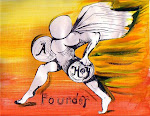It seems that there is a very close link between somebody who grinds up ingredients with a pestle and mortar, and the person who prescribes it. The text below is taken from the Worshipful Society's "History," which, while I suspect it is not entirely complete, is quite interesting. On further reading, I was delighted to discover that the Worshipful Society formulates courses and examines postgraduate qualifications in medical ethics, amongst other things. I nearly pissed myself!
The word 'apothecary' is derived from apotheca, meaning a place where wine, spices and herbs were stored. During the thirteenth century it came into use in this country to describe a person who kept a stock of these commodities, which he sold from his shop or street stall.
London apothecaries were originally members of another livery company, the Grocers', and together these tradesmen can be traced back to the Guild of Pepperers, an association formed in the City in 1180. By 1316, the Pepperers had been joined by the Spicers.
The Pepperers subsequently became wholesale merchant traders dealing en gros (hence the word 'grocer') and in 1428 were incorporated as the Worshipful Company of Grocers. The trade in spicery and the development of pharmacy, on the other hand, became interdependent and led to the emergence of spicer-apothecaries. These members of the Grocers' Company had their shops in Bucklersbury where they stored and sold spices, confectionery, perfumes, spiced wines, herbs and drugs which they compounded and dispensed to the public.
By the mid-sixteenth century apothecaries had become the equivalent of today's community pharmacists, dealing mainly with the preparation and sale of substances for medicinal purposes. Authority over medical practice, however, lay with the College of Physicians.
The London apothecaries with their specialist pharmacy skills petitioned for several years to secede from the Grocers' Company. Gideon de Laune, a wealthy and influential Huguenot, led the separatists. He was Apothecary to Anne of Denmark, wife of James I, which may have helped them gain the king's approval. The Worshipful Society of Apothecaries of London was incorporated by royal charter on 6 December 1617.
King James justified his decision in the House of Commons in 1624: "I myself did devise that corporation and do allow it. The grocers, who complain of it, are but merchants; the mystery of these apothecaries were belonging to apothecaries, wherein the grocers are unskilful; and therefore I think it is fitting they should be a corporation of themselves."
The Society's Hall in Blackfriars, formerly the guesthouse of the Dominican Priory of the Black Friars, was acquired in 1632. Destroyed in the Great Fire of London, it was re-built by 1672 on the same site, where it still stands.
From 1672 until 1922, the Society of Apothecaries manufactured and sold medicinal and pharmaceutical products at the Hall, and in 1673 it founded the Chelsea Physic Garden, only relinquishing managerial control in 1899.
In 1704 the Society won a key legal suit (known as the Rose Case) against the Royal College of Physicians in the House of Lords, which ruled that apothecaries could both prescribe and dispense medicines. This led directly to the evolution of the apothecary into today's general practitioner of medicine.
Just over a century later, as a result of the Apothecaries' Act of 1815, the Society was given the statutory right to conduct examinations and to grant licences to practise Medicine throughout England and Wales, as well as the duty of regulating such practice. It continues to license doctors today as a member of the United Examining Board, the only non-university medical licensing body in the United Kingdom.
Subscribe to:
Post Comments (Atom)

.jpg)






No comments:
Post a Comment